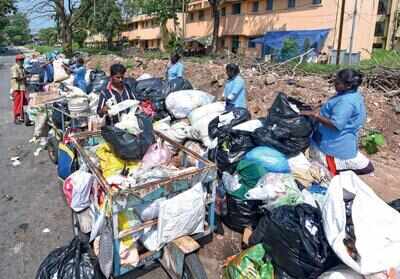
Thiruvananthapuram: The state government, which had approved engaging a project-management consultant for World Bank-funded Kerala solid waste management project at Rs 120 crore, has now set aside Rs 1.13 crore for project-preparation activities.
A major component of project preparation to avail the World Bank share will go into payment of salary to the staff — Rs 91.8 lakh. While the government is promoting virtual meetings in times of Covid-19, Rs 6 lakh has been set aside as meeting expenses on project preparation.
Chief minister Pinarayi Vijayan, while announcing the support of the parties for the project after a meeting, remarked on Saturday that the government is going for external funding since the funds allocated to local bodies for waste management are inadequate. This remark conceals the fact as to how nearly 50% of the funds received from the Centre under Swachh Bharat Mission (urban) — SBM(U) — remained unspent in the state between 2015-16 and 2019-20, as per data available till February 2020 which was obtained through RTI.
During the five fiscals, the state received Rs 97 crore as allocation from the Centre under SBM (urban). The total expenditure of this allocated sum from the Centre from 2015-16 to 2019-20 was Rs 50.21 crore, leaving an unspent balance of Rs 46.96 crore.
As per the reply to the RTI application, Suchitwa mission had allocated Rs 37.38 crore to 57 urban local bodies in the state for solid-waste management. Ground-level implementation of projects using the allotted sum is yet to be ascertained among urban local bodies.
The main objective touted under Kerala solid waste management project is to increase the institutional capacity of local bodies. The project is pushed mainly with the contention that local bodies had failed in waste management. Even the document prepared by Suchitwa mission, which has supposedly been the nodal agency for waste-management activities, for solid-waste management project also lists down lapses on the part of local bodies.
The service delivery gap assessment carried out as part of the project pinpointed glitches in the existing system. It noted that majority of urban local bodies did not comply with solid-waste management rules by not providing door-to-door collection services and processing of biodegradable waste at city and regional levels.
It also noted that compliance by bulk generators to process biodegradable waste within the premises is low and that local bodies did not provide door-to-door collection service for hotels and restaurants. It pointed out that urban local bodies failed in setting up biodegradable waste-treatment facilities, which resulted in biodegradable waste being disposed of in open spaces, water bodies, dumpsites, etc. causing problems of health and environment. While the integrated solid-waste management strategy lays emphasis on local body participation and sanitation agency in addressing problems related to waste management, World Bank-funded project will be mainly reliant on external consultant which will also run state- and district-level project management units in the state for three years and if necessary it will be extended.
A major component of project preparation to avail the World Bank share will go into payment of salary to the staff — Rs 91.8 lakh. While the government is promoting virtual meetings in times of Covid-19, Rs 6 lakh has been set aside as meeting expenses on project preparation.
Chief minister Pinarayi Vijayan, while announcing the support of the parties for the project after a meeting, remarked on Saturday that the government is going for external funding since the funds allocated to local bodies for waste management are inadequate. This remark conceals the fact as to how nearly 50% of the funds received from the Centre under Swachh Bharat Mission (urban) — SBM(U) — remained unspent in the state between 2015-16 and 2019-20, as per data available till February 2020 which was obtained through RTI.
During the five fiscals, the state received Rs 97 crore as allocation from the Centre under SBM (urban). The total expenditure of this allocated sum from the Centre from 2015-16 to 2019-20 was Rs 50.21 crore, leaving an unspent balance of Rs 46.96 crore.
As per the reply to the RTI application, Suchitwa mission had allocated Rs 37.38 crore to 57 urban local bodies in the state for solid-waste management. Ground-level implementation of projects using the allotted sum is yet to be ascertained among urban local bodies.
The main objective touted under Kerala solid waste management project is to increase the institutional capacity of local bodies. The project is pushed mainly with the contention that local bodies had failed in waste management. Even the document prepared by Suchitwa mission, which has supposedly been the nodal agency for waste-management activities, for solid-waste management project also lists down lapses on the part of local bodies.
The service delivery gap assessment carried out as part of the project pinpointed glitches in the existing system. It noted that majority of urban local bodies did not comply with solid-waste management rules by not providing door-to-door collection services and processing of biodegradable waste at city and regional levels.
It also noted that compliance by bulk generators to process biodegradable waste within the premises is low and that local bodies did not provide door-to-door collection service for hotels and restaurants. It pointed out that urban local bodies failed in setting up biodegradable waste-treatment facilities, which resulted in biodegradable waste being disposed of in open spaces, water bodies, dumpsites, etc. causing problems of health and environment. While the integrated solid-waste management strategy lays emphasis on local body participation and sanitation agency in addressing problems related to waste management, World Bank-funded project will be mainly reliant on external consultant which will also run state- and district-level project management units in the state for three years and if necessary it will be extended.

Coronavirus outbreak
Trending Topics
LATEST VIDEOS
City
 Shocking: 20-year-old Covid-19 patient raped by ambulance driver enroute to hospital in Kerala
Shocking: 20-year-old Covid-19 patient raped by ambulance driver enroute to hospital in Kerala  Daughters of this country will never forgive you, Kangana Ranaut hits back at Sanjay Raut
Daughters of this country will never forgive you, Kangana Ranaut hits back at Sanjay Raut  Sushant Singh Rajput death probe: CBI quizzes ambulance driver, asks 'Why Sandip Ssingh called him on June 16'?
Sushant Singh Rajput death probe: CBI quizzes ambulance driver, asks 'Why Sandip Ssingh called him on June 16'?  Procured drugs on Showik's instructions, Sushant's staffer Dipesh Sawant makes big revelation
Procured drugs on Showik's instructions, Sushant's staffer Dipesh Sawant makes big revelation
More from TOI
Navbharat Times
Featured Today in Travel
Quick Links
Kerala Coronavirus Helpline NumberHaryana Coronavirus Helpline NumberUP Coronavirus Helpline NumberBareilly NewsBhopal NewsCoronavirus in DelhiCoronavirus in HyderabadCoronavirus in IndiaCoronavirus symptomsCoronavirusRajasthan Coronavirus Helpline NumberAditya ThackerayShiv SenaFire in MumbaiAP Coronavirus Helpline NumberArvind KejriwalJammu Kashmir Coronavirus Helpline NumberSrinagar encounter
Get the app



